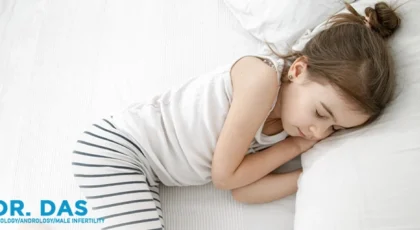
Kidney stones are often thought of as an adult health problem, but they are becoming increasingly common among children. Seeing a child suffer from the severe pain associated with kidney stones can be distressing for parents and caregivers. Understanding the causes, recognizing the symptoms early, and seeking appropriate treatment can make a significant difference in recovery and long-term health.
In this blog, we’ll explore everything you need to know about kidney stones in children, from causes and symptoms to treatment and prevention.
Contents
- 1 What Are Kidney Stones?
- 2 Causes of Kidney Stones in Children
- 3 Symptoms of Kidney Stones in Children
- 4 How Are Kidney Stones Diagnosed in Children?
- 5 Treatment Options for Kidney Stones in Children
- 6 Preventing Kidney Stones in Children
- 7 When Should You See a Doctor?
- 8 Managing Kidney Stones in Children: Expert Care and Prevention at Dr. Das Clinic
What Are Kidney Stones?
Kidney stones are hard, pebble-like materials that form inside the kidneys when substances like calcium, oxalate, and uric acid become too concentrated in the urine. They can vary in size from tiny grains to larger stones that can block the urinary tract, causing significant pain and complications.
Though kidney stones are more commonly diagnosed in adults, pediatric cases are on the rise due to lifestyle changes, dietary habits, and better diagnostic tools.
Causes of Kidney Stones in Children
Several factors can lead to the formation of kidney stones in children, including:
1. Dehydration
When children don’t drink enough water, their urine becomes highly concentrated with minerals that can form crystals and eventually stones.
2. Dietary Habits
High salt intake, processed foods, sugary beverages, and inadequate consumption of fruits and vegetables can all increase the risk of kidney stones. Surprisingly, too little calcium in the diet can also be a risk factor.
3. Family History
Kids with a family history of kidney stones have an increased risk. Genetic factors can affect how minerals and chemicals are handled by the body.
4. Medical Conditions
Certain health conditions, such as urinary tract infections (UTIs), hyperparathyroidism, inflammatory bowel diseases, and some metabolic disorders, can predispose children to stone formation.
5. Medications
Some medications, such as diuretics, steroids, and high-dose vitamin D or calcium supplements, may contribute to the development of stones.
Symptoms of Kidney Stones in Children
Recognizing kidney stones in children can be challenging, especially in very young kids who cannot describe their pain clearly. Here are the common signs to watch for:
- Severe pain: Sharp, intense pain often felt in the back, side, lower abdomen, or groin, which can be sudden and severe.
- Hematuria: Blood in the urine, which may cause it to appear pink, red, or brown.
- Painful urination: Burning or stinging sensation during urination.
- Frequent urination: The need to urinate more frequently than normal.
- Nausea and vomiting: Often linked with intense pain.
- Fever and chills: These symptoms may occur if an infection accompanies the kidney stone, signaling a potential complication.
- Restlessness or irritability: Especially in toddlers who cannot express where it hurts.
If your child shows any of these symptoms, it is important to consult a doctor immediately.
How Are Kidney Stones Diagnosed in Children?
Diagnosing kidney stones in children typically involves:
- Urinalysis: A urine sample is tested to detect blood, signs of infection, or high levels of minerals that could indicate the presence of a kidney stone.
- Ultrasound: A non-invasive imaging test often used to detect stones safely without radiation.
- CT Scan: In some cases, a CT scan provides more detailed images to locate stones and assess their size and position.
- Blood Tests: These tests check for mineral imbalances, kidney function, and infection indicators.
Timely diagnosis is essential for successful treatment and to help prevent future stone development.
Treatment Options for Kidney Stones in Children
Treatment depends on the size, location, type of the kidney stone, and the severity of symptoms. The primary goals are to relieve pain, eliminate the stone, and prevent further stones from forming. The following are the treatment options for kidney stones in children.
1. Conservative Management
For small stones:
- Increased Hydration: Drinking plenty of water can help flush the stone out naturally.
- Pain Relief: Over-the-counter or prescribed pain medications help manage discomfort.
- Medical Expulsive Therapy: Alpha-blocker medications may be prescribed to relax the muscles in the ureter and facilitate stone passage.
2. Surgical Intervention
For larger stones or stones causing infection or blockage:
- Shock Wave Lithotripsy (SWL): Powerful sound waves are applied to fragment stones into smaller pieces, making them easier to pass.
- Ureteroscopy: A small scope is passed into the bladder and ureter to locate and remove the stone.
- Percutaneous Nephrolithotomy: In rare cases, a small incision is made in the back to remove larger stones directly from the kidney.
Most children recover well with appropriate treatment, although follow-up is often necessary to prevent recurrence.
Preventing Kidney Stones in Children
Prevention is key, especially if your child has had kidney stones before. Here are essential tips for reducing the risk:
1. Stay Hydrated
Motivate your child to stay well-hydrated by drinking ample water during the day. Clear urine indicates good hydration.
2. Balanced Diet
- Limit high-sodium foods like processed snacks, fast food, and canned soups.
- Include fruits and vegetables that are high in potassium and citrate, which help prevent stone formation.
- Maintain normal dietary calcium intake. Consuming too little calcium may actually raise the risk of developing stones.
- Limit sugar intake, particularly from sugary sodas and sweetened juices.
3. Medical Monitoring
If your child has a history of kidney stones or an underlying medical condition, regular follow-ups with a pediatric urologist or nephrologist are important.
4. Encourage Regular Bathroom Breaks
Holding in urine for long periods can lead to concentrated urine. Teach children to urinate when they feel the urge.
When Should You See a Doctor?
Seek immediate medical attention if your child:
- Experiences severe pain in the back, abdomen, or sides.
- Has blood in the urine.
- Shows signs of infection, like fever and chills.
- Has difficulty passing urine or painful urination.
Early medical intervention can prevent serious complications like kidney infections or permanent kidney damage.
Managing Kidney Stones in Children: Expert Care and Prevention at Dr. Das Clinic
Kidney stones in children are a serious but manageable condition. With prompt diagnosis, appropriate treatment, and preventive measures, most children recover fully and lead healthy lives. Promoting good hydration habits, a balanced diet, and regular medical check-ups are vital steps in keeping kidney stones at bay.
If you suspect your child may have kidney stones or if there is a family history, do not hesitate to consult a pediatric specialist. Dr Das Clinic offers expert children urology treatment in Bahrain, providing comprehensive care for pediatric kidney stones and other urological conditions. Trust their experienced team to ensure the best care for your child’s health and well-being.









